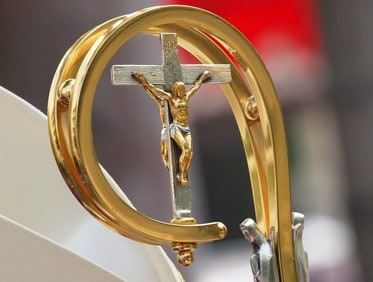
Is this what obedience looks like? / Mopic / Shutterstock
Yes, Catholics should be more obedient to their bishops. For their own good, really. If they don’t, they will definitely pay the price.
Blood pressure up yet?
I suspect for some of us it will be. I have some friends and family, observant Catholics, who would try to smack me for starting a conversation that way (or trying to end one that way!). And I have some friends and family, observant Catholics, who would exclaim, “About time! A Jesuit preaching about obeying their bishop.” Either way you lean, I just ask for a little patience—I am not saying what you probably think I’m saying.
I am not arguing that Catholics need to “pray, pay, and obey” as the old shibboleth goes. I am not advocating for wider adherence to a particular church teaching that has a dear place in my personal ideology. In fact, the type of obedience I am advocating for really isn’t about ideas at all, but relationships.
The best leaders do not lead by fear or even by intellect—they move our hearts. When we love a leader and trust her, she can act as a powerful force binding a group together, giving everyone a common identity.
Think for example of the Queen of England. It has been many years since the monarch commanded the type of obedience that would instill fear in British subjects. But in order to become a citizen, serve in the military, or take a seat in Parliament, a person must still take the Oath of Allegiance to the Queen and her successors.
I’ll admit, as a good American, I had trouble understanding this idea. Here we pledge allegiance to the flag, take oaths to the Constitution, define ourselves by ideas like freedom or democracy.1 It is only when I reflected on a group a little closer to home that I began to understand the value of having a living person step into that role.
In my family, our “head of state” is my grandmother Georgia. She is, without question, our matriarch. A strong, vivacious woman with a gregarious personality, she doesn’t give orders per se, but you better believe that her five boys (my father and uncles) know to whom they owe allegiance and whose feelings and wishes they are going to take into account. And we, the grandchildren, know who we are by our relationship to her. We’re a diverse group, after all, and without a woman like her, it would be hard to connect the dots between a Jesuit deacon, a Mandarin-learning golfer, a budding fashionista, and a world traveling college student.

This may be true for blizzards but not for the church.
Alyson Hurt / Flickr Creative Commons
“You will be assimilated. Resistance is futile.” Often, our image of obedience is colored by our fear of a Borg-like hive mind. Obedience is viewed as the enemy of personal expression and individuality. Those who espouse obedience are imagined as speaking with a tinny, mechanical voice, desiring only to assimilate others into themselves. Undoubtedly, this is a real fear, and obedience as a means to power or self-propagation should always be opposed—most especially by Catholics, who have been taught the unique value of each person. In fact, the type of obedience I would like to argue for is the opposite of this type of assimilation.
Obedience, when understood as allegiance, actually enables diversity. Differences, when they are not qualified by some greater allegiance, quickly become divisions. If my cousin and I have a disagreement, even an argument, our common family bonds hold us together despite that. Without those relationships, however, nothing would stop us from simply walking away from each other and finding different people to hang out with on holidays. (We could call this the “Cousin Eddie Principle.”)
That is why the bishop has such an important role for Catholics. Of course, the ultimate guarantee and source of our unity is Jesus. But the Christian reality has always been an embodied, incarnational one—a personal reality if you will. The bishop can serve as that personal center who helps us realize our unity in the midst of our diversity. Sticking together with the bishop helps us remain united even when we may differ in our style of worship, our cultural experience, or even our ideas about Jesus, the church, or anything else.
Similarly, if we are traveling to a far off country, we know that, despite their differences in language or custom, we are among our brothers and sisters in faith because of their connection to the pope. One of the most touching examples of this occurred when Japan was reopened to foreign visitors in the middle of the 19th century. When a French priest first set up a church in Nagasaki, he was visited by representatives of local families who had remained Christian despite 250 years of persecution. They went up to this new priest and tested him to see if he was a Catholic like them. And how did they do that after having been out of touch with any priests or other Catholics for two plus centuries? They asked him if he venerated Mary and if he obeyed the pope! They wanted to know who he pledged allegiance to, not what.
We may disagree with our fellow Catholics or be different from them in a variety of ways, but we will know that we are members of the same church family (and that we cannot walk away from them) because we all connect to the same center, the bishop (whether the bishop of Rome or “Anytown, USA”), from a thousand different directions.

Don’t mess with Grandma. And get ready to be loved immeasurably.
giorgiomtb / Shutterstock
This family connection does not just work from the bottom to the top, though. Nobody loves us grandkids more fiercely than Grandma. Similarly, no one should love the smallest children of the Church and fight for them more fiercely than the bishop who has the care for them.
That is perhaps why it hurts so much when a bishop fails to protect us, as occurred in the sexual abuse scandal. He has failed to take up his role as a “grandmother” to us all, whether for the sake of institutional security or for an inordinate sheltering for a particular priest.
And too often, even some bishops have related to Catholics as if obedience was mostly a matter of command and control. Now, I will fight for the bishop’s right to administer the diocese and set appropriate boundaries for the diversity of Catholic moral and theological opinions. I shake my head sadly, however, whenever a bishop attempts to do these things as if it were not related to and derived from his relationship of love and care for the people of God. Closing a parish, proclaiming moral truths, and calling people to holiness—these are not tasks which can be accomplished by hard power. Even evangelization’s toughest tasks must be expressed within a relationship of love, else they are not an example of Christian ministry at all.
Pope Francis expressed a similar point when he spoke to the papal nuncios last summer. The nuncios are ambassadors of the pope who play a key role in selecting new bishops. On this point, Francis asked that they look for candidates who are “close to the people” and able to “‘watch over’ the flock, to keep watch, imbue hope, that they have sun and light in their hearts, to lovingly and patiently support the plans which God brings about in His people.” And who was Francis’ example of this attitude? A family man: St. Joseph. Just like Joseph watched over Mary and Jesus with care, so he wants the bishops to do.
So, fellow Catholics (including our brothers the bishops), let us stick together like glue. Let us gather around our bishop like a family around the table and let us declare our allegiance to him in Christ. And, most of all, let us love each other through it all.
Cover image credit: Blue Planet Earth / Shutterstock
- While the president is our personal head of state, our current politics is so partisan that the ability of the president to represent all America to everyone has been in decline for decades. ↩


